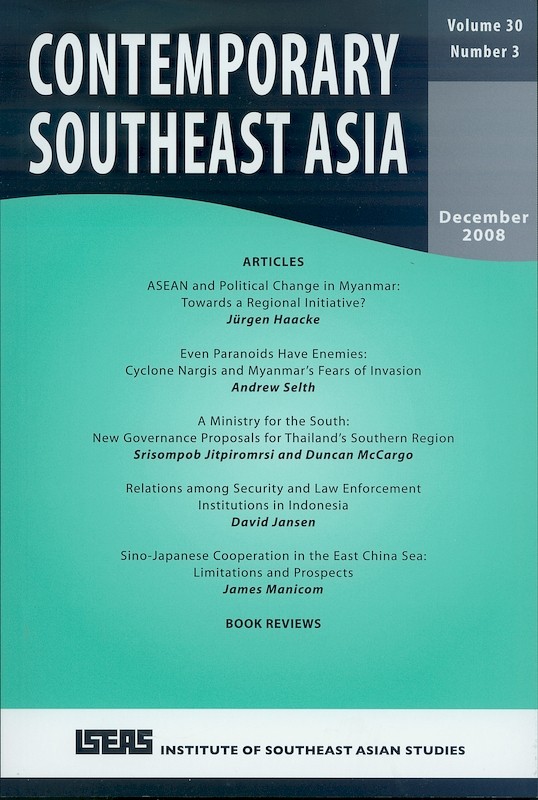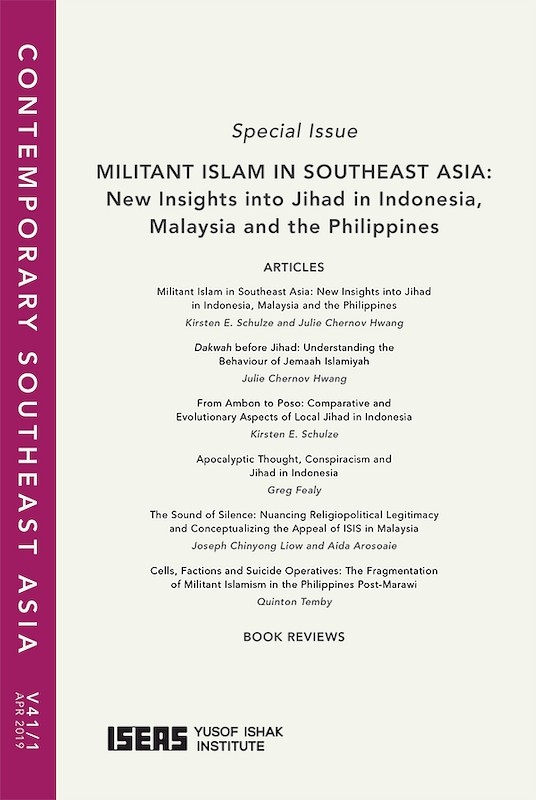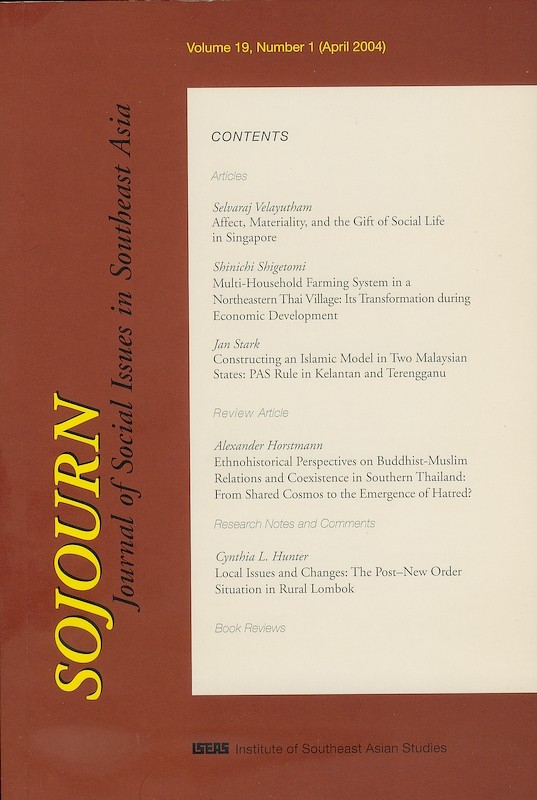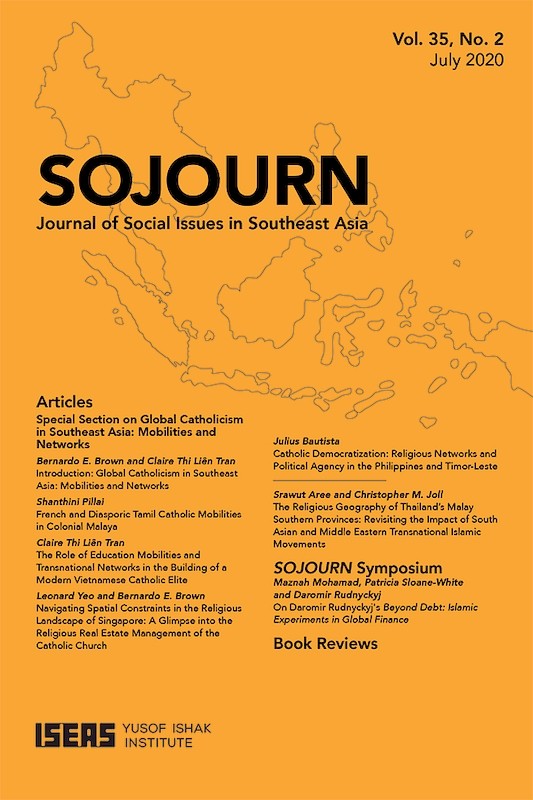Contemporary Southeast Asia Vol. 32/2 (Aug 2010). Special focus on "Southern Thailand: Anatomy of an Insurgency"
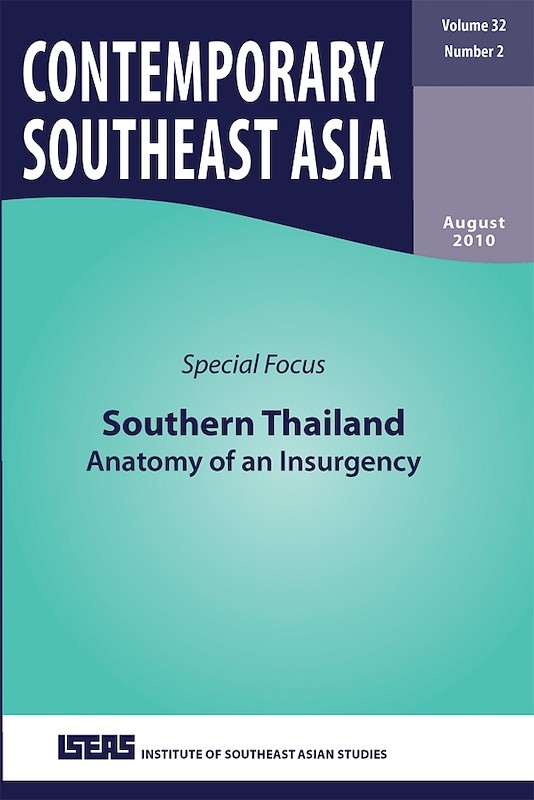
Date of publication:
August 2010
Publisher:
Institute of Southeast Asian Studies
Number of pages:
192
Code:
CS32/2
Contents
-
Contemporary Southeast Asia Vol. 32/2 (Aug 2010). Special focus on "Southern Thailand: Anatomy of an Insurgency"
[Whole Publication] -
Preliminary pages
- ARTICLES
-
Fighting with Ghosts: Querying Thailand's "Southern Fire", by Marc Askew, author see abstractThis article explores several key issues that remain under-examined or problematic in assessments of Thailand's ongoing southern crisis. It argues that the "ghosts" behind the ongoing turbulence in Thailand's southern border provinces are not only mysterious insurgents, but also the imponderable and contentious issues that continue to pervade discourse and policy debate after six years of unrest. First, it addresses the problematic issue of depicting the violence solely as an ideologically-driven "insurgency", highlighting the fact of systemic instability in the borderland. Noting the complexity of the violence, the paper also draws attention to the "politics of naming": i.e., the concern of the Thai state to define the violence as non-political for an international audience. Secondly, it outlines the insurgency-related dimensions of the violence and the enigmatic character of the insurgents' organization, identity and aims, which ultimately lie at the heart of the key dilemmas facing the Thai state in efforts to reduce the violence. It then considers key competing public "texts" that have emerged to define the putative causes of and solutions to the southern "problem". Finally, the paper addresses the generally ignored topic of the varied positions of the Malay Muslim population and the implications of this for discussions of the meaning and legitimacy of insurgents' political violence.
-
The Southern Thai Conflict Six Years On: Insurgency, Not Just Crime, by Srisompob Jitpiromsri, Duncan McCargo, authors see abstractThis article reviews recent developments in the southern Thai conflict, noting that following the implementation of tougher security measures in 200708, levels of violence declined somewhat before increasing again. In the wake of their failure to find sustainable methods of containing the conflict, the Thai military is now trying to claim that many of the violent incidents in the region are the result of "ordinary" crime. Despite these attempts to discredit the essentially political motives that underpin the violence, the authors argue that the conflict reflects a crisis of state legitimacy in the far south. To date, the Democrat-led government has failed to engage seriously with political solutions to the southern conflict.
-
The Bureaucracy: Problem or Solution to Thailand's Far South Flames?, by Ora-orn Poocharoen, author see abstractThis paper analyses one aspect of the problem of Thailand's ongoing insurgency, namely the bureaucratic structure in the far south and the role of the bureaucrat as an agent. The discourse on structure emphasizes the need to make the bureaucracy better "integrated" (buranakarn) in order to improve coordination among the key agencies responsible for tackling the conflict. During 200409 there were persistent changes to the bureaucratic structure in the far south which hindered the effective implementation of policies. At the same time, the discourse on bureaucrats focused on the need to send "virtuous" individuals to the region, to remove those who had misbehaved, and to offer training and special rewards for those who remained. Increasingly, fewer bureaucrats are willing to work in the troubled provinces which has led public agencies to implement new recruitment strategies. A relatively recent development has been a policy of localization whereby local Malay Muslims are appointed to the bureaucracy so as to create a more representative bureaucracy in the region. This paper provides details of the above issues and discusses the importance of understanding the two levels of analysis of structure and agent.
-
People's Patron or Patronizing the People? The Southern Border Provinces Administrative Centre in Perspective, by Matt Wheeler, author see abstractThe Southern Border Provinces Administrative Centre (SBPAC) was established in 1981 to monitor the work of civilian government agencies and to coordinate with security forces in Thailand's troubled Malay Muslim majority provinces in the south. Over two decades, the SBPAC developed a reputation for improving the quality of local governance and curbing support for armed separatism. The dissolution of the SPBAC, and its suppressive counterpart the Civilian-Police-Military Command-43 (CPM-43), in 2002 figures prominently in many existing accounts of the contemporary insurgency. Conflicting interpretations of the role of the SBPAC highlight a distinction between its mundane functions and its apparent value to many Malay Muslims as a symbol of the Thai state's goodwill. Studies from the 1990s show that in spite of its shortcomings, the SBPAC achieved a degree of success in building confidence in the Thai state among local Malay Muslim leaders. The decision to revive the SBPAC in 2006 attests to the appeal of its "brand" and the logic of its hearts-and-minds approach to security and development. However, absent mechanisms for popular political representation at the sub-regional level, such an approach is of limited utility.
-
Malaysia and Thailand's Southern Conflict: Reconciling Security and Ethnicity, by John Funston, author see abstractMalaysia's policy towards southern Thailand has always required a balance between the country's internal security and concern about a neighbouring Muslim minority linked not only by religion but also ethnicity and culture. Security was a paramount concern at independence in 1957, with the southern provinces used as a base by the Communist Party of Malaya (CPM), the Communist Party of Thailand and Malay irredentists. But after Parti Islam made inroads against the ruling United Malays National Organization by capturing Kelantan (a state adjacent to Thailand) in the 1959 elections, the two premier Malay parties competed to present themselves as the protector of Thailand's Malay Muslims. Security concerns eased with the surrender of the CPM in 1989, but re-emerged in late 2001 with the resumption of conflict in southern Thailand, and the surfacing of militant Islamic groups in Malaysia. Though initially supportive of Thai security interests, Malaysia's delicate balance swung towards focusing on the well-being of Thailand's Malays in 2004: the tragic 28 April Krue Se mosque and 25 October Tak Bai incidents led to strong Malaysian protests, an unprecedented parliamentary debate and a general willingness to push the envelope on intervention in Thailand's internal affairs. Tensions remained high through much of 2005, with Thailand alleging that Malaysia was complicit in southern violence. Nonetheless Malaysia ensured Thailand was not embarrassed in international forums such as the Organization of Islamic Conference or ASEAN, and relations improved late in the year. Changes in Thai policy after the September 2006 coup were largely welcomed in Malaysia, but since then Thai-Malaysian cooperation to address the problem has made little headway.
-
Religion and Conflict in Southern Thailand: Beyond Rounding Up the Usual Suspects, by Christopher M Joll, author see abstractThis article takes clues from Mark Juergensmeyer's comparative study of religious violence and develops Imtiyaz Yusuf's proposal that the southern violence represents a conflict between the competing exclusive ethno-religious worldviews of Thai satsanaa and Malay agama. It moves beyond the routine rounding up and interrogation of the "usual suspects" in two ways: first, by including a range of uncivil elements of Thai Buddhism, and second, by examining often ill-conceived Thai interference in Islamic matters. The article also poses questions about the "usual suspects", beginning with a description of Islamic movements which contribute to an increasingly divided Islamic community less able to prevent and limit Islamic violence. The paper investigates the Islamic credentials of the insurgency and distinguishes between the presence of jihadi rhetoric with a developed jihadi rationale, a recent development in southern Thailand. The article argues for the localization of the global, a process which features local actors and agents that are informed by parochial and highly ethnocized version of Islam that is countering occasionally uncivil Buddhist opponents, as an approach for studying violence in the Thai south.
-
The Thai Press and the Southern Insurgency: Nothing More to Report, by Noi Thammasathien, author see abstractThe continuing insurgency in the far south of Thailand has attracted less and less attention from the national press, with limited coverage provided to the public save for reports on the daily catalog of violence. This response seems at odds with the media's acceptance that the insurgency is one of the most serious problems threatening Thailand's unity. According to the press itself, the lack of enthusiasm to report the issue is not only due to the dearth of new or substantial developments, but also because of a perception that the present situation is relatively well covered by their existing news gathering system. This paper argues, however, that the Thai press' coverage of the southern insurgency is in fact problematic and unreliable for three reasons. First, there is a tendency for the press to emphasize the drama of the conflict without examining the root causes. Second, the news gathering mechanism that draws information primarily from local stringers and reporters is inadequate. Third, and more importantly, the press has allowed itself to be influenced by the government, resulting in biased coverage of the southern border provinces conflict.
- BOOK REVIEWS
-
BOOK REVIEW: Islam and Politics in Southeast Asia. Edited by Johan Saravanamuttu, by Ahmad Fauzi Abdul Hamid, author
-
BOOK REVIEW: Philippine Security in the Age of Terror: Natonal, Regional, and Global Challenges in the Post-9/11 World. By Rommel Banlaoi, by Carl Barker, author
-
BOOK REVIEW: State of Authority: The State in Society in Indonesia. Edited by Gerry van Klinken and Joshua Barker, by Vedi R Hadiz, author
-
BOOK REVIEW: Indochina: An Ambiguous Colonization, 1858-1954. By Pierre Brocheux and Daniel Hemery, by Milton Osborne, author
-
BOOK REVIEW: Vietnam 1946: How the War Began. By Stein Tonnesson, by Qiang Zhai, author
-
BOOK REVIEW: The United States in Asia. By Robert G. Sutter, by Ta Minh Tuan, author

